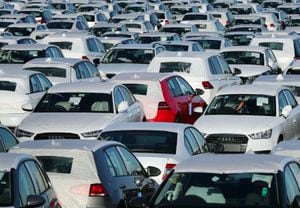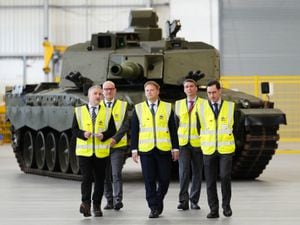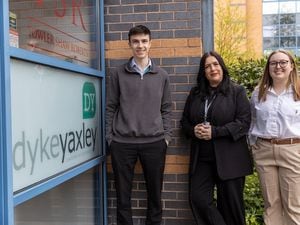UK car sales fell for the first time in six years in 2017, reveals SMMT
New car sales fell by around 5.6 per cent last year – the first drop in six years – amid falling business and consumer confidence, according to the motor industry's trade association.

The figures are bad news for the West Midlands' hundreds of engineering and manufacturing companies in the vehicle industry supply chain, which employs thousands of workers across the region.
Approximately 2.54 million new cars were registered in 2017 compared with 2.69 million the previous year, the Society of Motor Manufacturers and Traders (SMMT) said.
December saw an even sharper decline of 13.9 per cent.
Most companies saw their sales fall last month, with West Midlands auto giant JLR seeing a 20 per cent drop in demand for its Jaguars and almost a 16 per cent fall in Land Rover sales.
But the company – which builds its engines at its £1bn factory on the i54 site in Wolverhampton, beside the M54, and exports 80 per cent of its British-built vehicles – said its 2017 performance had held firm at 118,213 cars sold in the year, down just 77 on 2016's figures.
And more Jaguars were sold in the UK in 2017 than ever before at 35,541 - more than the number sold in both 2011 and 2012 combined. And it is predicting a stronger 2018 with its new Discovery, Range Rover Velar, E-Pace Jaguar, hybrid Range Rovers and the upcoming all-electric Jaguar i-Pace.
Jeremy Hicks, Jaguar Land Rover UK managing director, said: “Our business has continued to see strong growth in the UK in 2017, with new models entering the marketplace helping us to sell more than 118,000 vehicles and our retail network investing more than £500m in building brand new or renovated Jaguar Land Rover sites. To put this sales growth into perspective this is more than double the 57,000 vehicles Jaguar Land Rover sold in total in the UK back in 2011.
"We are delighted with this performance amidst what has undoubtedly been a tough marketplace with ongoing BREXIT negotiations and continued misconceptions around clean, modern diesel technology causing consumer uncertainty during 2017."
Across the UK car industry as a whole, demand for diesels was down 17 per cent last year, slumping by 31 per cent last month.
SMMT chief executive Mike Hawes predicted that the market's decline will continue in 2018, with registrations down 5-7 per cent.
He described 2017 as a "very, very volatile year" with the fall in new car sales caused by "a drop in both business and consumer confidence".
Mr Hawes also revealed that uncertainty over transitional arrangements following the UK's withdrawal from the European Union in March 2019 has caused some manufacturers to delay investment decisions.
If there is no clarity by the end of March they will have to start implementing "contingency plans" which could harm funding for UK operations, he added.
Asked about the decline in diesel cars, Mr Hawes said there is "underlying confusion" among consumers about whether buying such vehicles is "the right thing to do".
Rather than choosing alternatives, many people are "just sitting on their hands", he said.
In November's Budget, Chancellor Philip Hammond announced a tax hike on new diesel cars from April 1.
All diesels are expected to be subjected to a one-band increase in the first year vehicle excise duty (VED) rate.
This came after the Government unveiled plans to ban the sale of all conventional diesel and petrol cars by 2040.
In the key automotive manufacturing region of the West Midlands, car makers and component suppliers will be watching the falling figures with varying degrees of alarm.
West Midlands Mayor Andy Street said he had "mixed feelings" about the report, but was "determined" that electric vehicle manufacture would be based in his region.
He said removing all diesel cars from the streets was "too simplistic", telling BBC Radio 4's Today programme: "What we do need to think about is how are we going to move the most polluting old diesels off our streets because the really damaging issue is the nitrogen oxide pollutants - the report talked about carbon dioxide but it's nitrogen oxide which is the most damaging."
Mr Street said he thought clean air zone proposals would "probably lead to" increasing taxes for polluting vehicles, but said: "It mustn't be blunt because that doesn't reflect the science and it's not also fair to consumers."
The SMMT said the amount of CO2 emitted by the average new car bought in 2017 is expected to have risen year-on-year for the first time in 20 years, reaching 121 grams per kilometre.
This is because the market share of diesel cars - which produce less CO2 than petrol cars as they are more fuel efficient - dropped from 48 per cent in 2016 to around 42 per cent.
The increase makes it harder for manufacturers to meet an EU target of 95 grams per kilometre by 2021.
Petrol registrations dropped 1.6 per cent in December but rose 2.8 per cent in 2017 as a whole.
Alternatively fuelled vehicles reached a record market share of around 4.7 per cent last year.
New car sales to private motorists were down 6.5 per cent, fleet down 4.4 per cent and business down 7.7 per cent.
Mr Hawes stressed that 2017 was still around the third best year for new car registrations in the past decade and followed record performances in 2015 and 2016.
"The market is still at historic highs," he said.
Jim Holder, editorial director of What Car? magazine, said turning the sharp decline at the end of 2017 into a loss of just 5-7 per cent in 2018 will be a "real challenge" for the industry.
"That's going to take a massive swing in public perception," he said. "I would say there is a risk of double digit (decline) unless all the good news stories come true, and that includes turning some pretty entrenched views around on the economy and diesel."





